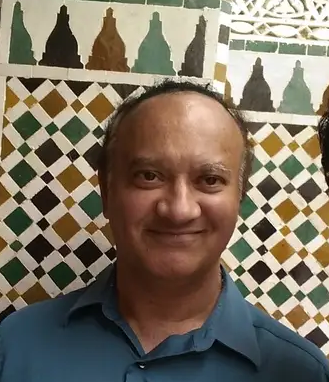It is with sadness that I came to know that Shabbir Akhtar passed away the night of July 25, 2023, during his walking routine in Oxford, UK. He had a heart attack, and he left this world on the way to the hospital. He is outlived by his wife and his 16-year-old son. During the first wave of Covid-19, he stayed for long in hospital and recovered with difficulty. He resumed his intellectual activity slowly afterwards.

Shabbir was born in Pakistan; he grew up in Bradford, pursued his BA and MA at the University of Cambridge, and PhD in the philosophy of religion at the University of Calgary, in Canada. He taught at the International Islamic University in Malaysia (1994-1997), and at the Old Dominion University in Virginia, US (2002-2011), before returning home. Since 2012, Shabbir has been a member of the Faculty of Theology and Religions at the University of Oxford.
I first knew Shabbir through his works, especially his Quran and the Secular Mind (2007). I then met him at the Oxford Center for Islamic Studies in 2017. We invited him to Casablanca Seminars of 2018, on pluralism in Islamic thought, organized by Reset Dialogues on Civilizations and Al Saoud Research Foundation of Casablanca. Shabbir spoke at the conference on how contemporary Christian theologians read the Islamic scriptures. We have become friends since then; we have exchanged a lot on the phone and emails, until a few days before his sudden departure.
His early publications include: A Faith for all Reasons: Islam and the Challenge of the Modern World (1990), The Light in the Enlightenment: Christianity and the Secular Age (1990), The Final Imperative: An Islamic Theology of Liberation (1991), Islam as Political Religion: The Future of an Imperial Faith (2010). In 2018, he published The New Testament in Muslim Eyes: Paul’s letter to the Galatians (Routledge, 2018), “the first such work on the Greek New Testament in Islamic history.” His Be Careful with Muhammad (1989) was re-published with a new introduction in 2020, and was also translated in French in 2022, Ne Touchez Pas à Mahomet! Some of his books have been translated in other languages of Muslim majority societies.
As a scholar of modern-contemporary Islamic thought (philosophy and theology in focus), and of the emerging European Islamic Thought, I can say that I have been disillusioned by scholarship in this field since he is hardly read or cited, although he has very interesting ideas and approach to Islamic philosophy-theology. A believer and observer himself, as I came to know through my contact with him, he believed that Islamic thought has a lot yet to offer, but that it has also to radically change innovatively. While he was critical of both apologetic Muslim scholars and cynical Christian theologians, he believed that the three monotheistic traditions can raise a single front against atheist secularism that he thought sells humanism but steals humanity, if I can put it so. More precisely, he was against what he called “amoral ideology of corporate capitalism, fortified by fanatical market fundamentalists willing to kill worldwide;” this ravaging capitalism has, according to him, finished with moral Christianity and democracy in the West, and in the US in particular. For Islamic theology, Shabbir believed that there is a need to formulate modern natural theology, to speak to the moderns, Muslims and non-Muslims. As to Islamic philosophy, he contended that it was moribund in Muslim majority and minority contexts, but he thought that Muslims of the Western context were more able to renew the tradition, seeing their being in the heart of the modern world, its merits and limitations considered. The early medieval Mu‘tazilite (rationalist) theologians appeared to be his favorites. He also believed that perennial philosophy could be the future of Islamic philosophy.
Shabbir had a sharp mind, very critical of scholars he does not agree with, without “intellectual diplomacy” in his wordings, a fact which may have played against him and his academic stability. For him, liberty comes first; stability nowadays is for the less free.
I hope future scholars of modern Islamic thought, and European Islamic thought in particular, can critically examine his works and make use of them. He has left an important legacy to engage with.
The scholarly community has lost a sharp mind! Farewell, Shabbir!
Cover photo: one of Casablanca Seminars’ panels (2018). On the right, Shabbir Akhtar. All the pictures’ credits belong to Reset Dialogues on Civilizations.



